These beds go back to at least the 1400s, when people in drafty old houses used heavy fabrics over their beds to block cold air. The design stuck around because it worked — especially before central heating was a thing. In wealthier homes, the practical design quickly turned into a symbol of status, with carved wooden posts and layers of embroidered curtains. Later, lighter versions made their way into warmer climates where they doubled as mosquito protection.

By the 18th and 19th centuries, canopy beds were more about appearance than insulation. Materials changed with the times — iron frames showed up in military-style setups, while brassed cast iron became popular in city homes. The frames were adaptable and kept pace with trends, whether that meant chunky Victorian columns or slim Sheraton-style posts.
In the 20th century, canopy beds made another strong showing, especially in the 1970s. Fabric styles ranged from crisp white organdy to bold floral chintz. Designers played around with the idea, using everything from plaid tent-like structures in boys’ rooms to full-height installations with mirrored panels and dramatic drapes. Some setups were purely decorative, while others created small private spaces within large rooms.
Below, we’ve pulled together a wide range of these vintage canopy beds from the 1970s — a time when the design was both nostalgic and newly creative. Some of the examples below are classic and elegant, others modern and breezy, and many are fabulously frilly. These beds are truly a timeless pieces of home décor, no matter what century you’re in.
A look back at some beautiful vintage canopy beds from the 1970s
Article by Carleton Varney, interior designer (1972)
The four-poster bed with a canopy, known as a tester bed, is back in a big way. At the recent furniture market in Chicago, the canopy bed look was bigger than life.
It really has never been out for some people, and reproductions of Williamsburg canopy beds have been available for years. Sometimes the fabric canopy is straight with a valance border, and other times the canopy has a bowed shape.

The history of the canopy & their seventies revival
Canopy beds — or tester beds — have been around for centuries, as far back as the 15th century in England and France.
In 17th century decorating, there were many Jacobean designed beds with canopies. and in those days without central heating, the fabric, hung on the top and generally at the bed sides, too, was used to keep out the cold drafts.
The tester or canopy bed was also used in tropical climates: the canopy fabrics were not damasks, heavy velvets or chintz, but were sheer fabrics, oftentimes mosquito netting, to keep out insects.

Vintage canopy beds from the 1970s
Every little girl wants a canopy bed, so the story goes, and I have to admit that little girls dig the white-painted canopy bed with white organdy top and white ruffled valance.
And when little girls grow up, they want canopy beds, too. I have planned many rooms with canopy beds, not only in pink and white, but also in green and red and yellow and orange — and in just about every kind of fabric on the market.

I have decorated many beds with canopies of damask designed fabrics or of bright flowered chintz, lined with colorful stripes.
MORE: See a ’70s model home: A pretty, practical, family-friendly house

Different ways to use canopy beds
I have seen tent canopy beds of a campaign design for a young boy’s room, the canopy being of bright plaid fabric. And I have seen many charming traditional bedrooms with canopied beds.
One room with a tester bed with a soft pink valance from Heritage’s “Tour de Fr

ance” collection also featured a cozy corner with a small fireplace. and it was an ideal hideaway for reading or dining as well as restful sleep.
The nylon shag carpet was pink touched with brown, and the bedspread was soft rose on white cut velvet.

Wood and other materials for the frame
The bed frame of a canopy or tester bed does not always have to be walnut or mahogany. Once I designed an ultramodern room which had a stainless steel canopy bed — the frame was steel and the canopy was of a modern geometric design linen.
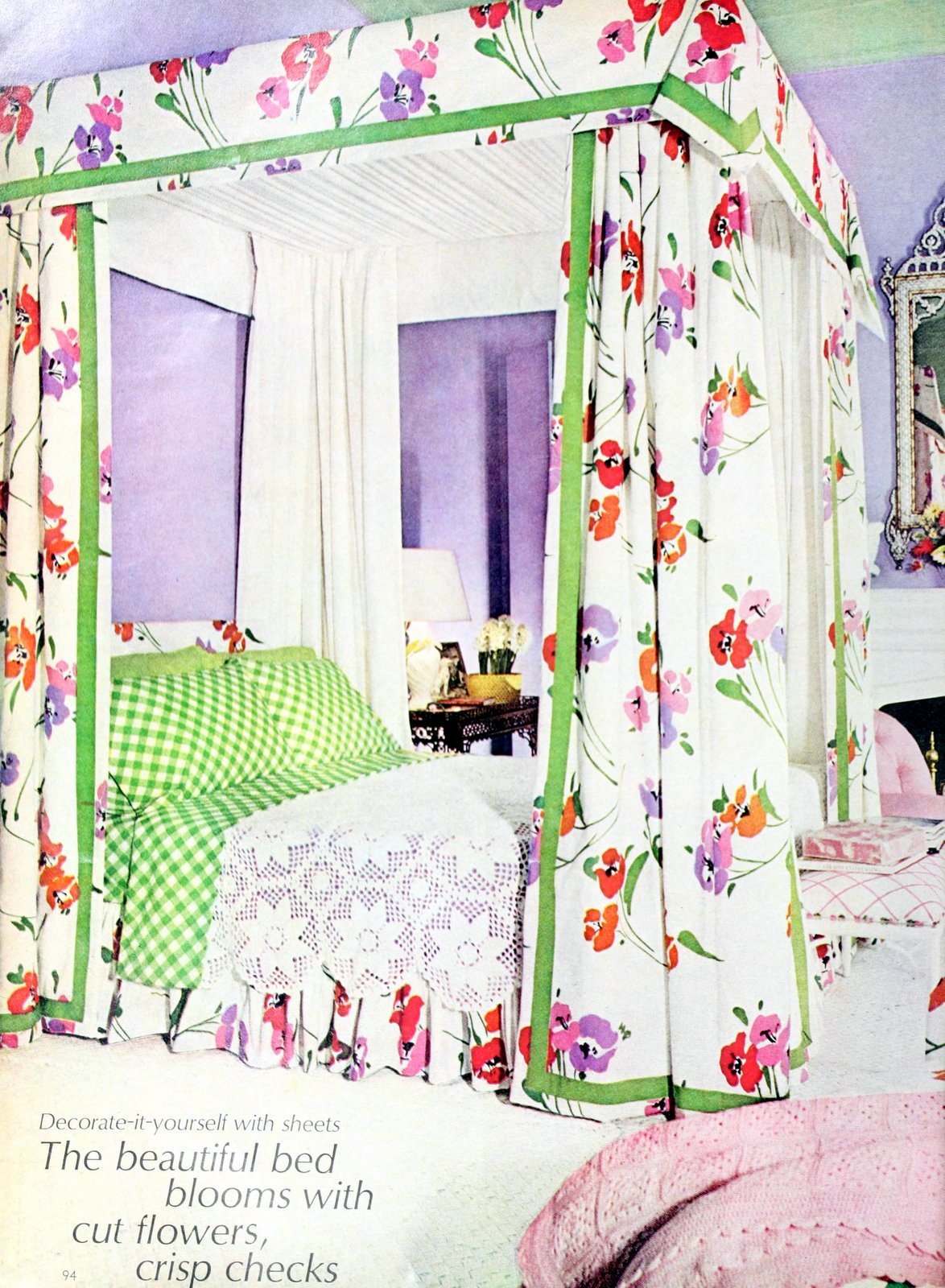
The frame of a canopy bed can be painted white and trimmed with apple green, black trimmed with gold, or any colors you wish to coordinate with your decorating scheme.
If you look carefully, you may find a good old tester bed in a thrift shop and can paint and decorate it yourself.

Iron bedframe with high curtained surround (1970s)

Romantic old-fashioned canopy bed in earthy colors

Side-by-side matching twin canopy beds

Popular vintage Sears canopy bed coordinates


Vintage yellow canopy bed and 70s teen bedroom decor

MORE: Dozens of kitschy ’70s kitchen accessories your mom or grandma probably used to have


Blue canopy bed with upholstered top

Bedroom furniture set with gilded aceents
MORE: Remember these vintage gold-edged bedroom furniture sets from the ’60s?

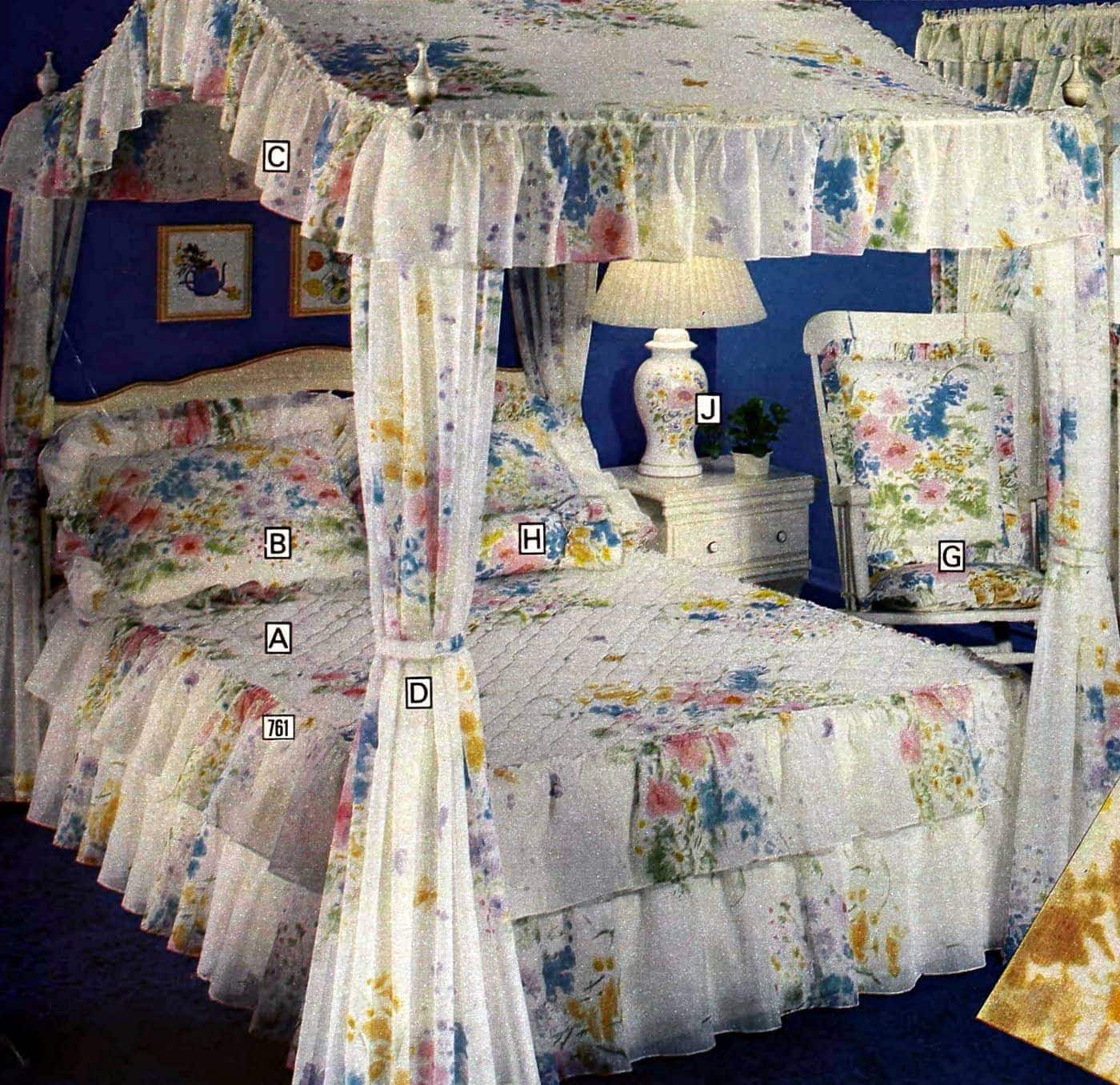

DON’T MISS: Retro 1970s sheet sets with bright & bold colors and bonus flower power
Master bedroom canopy beds

MORE: Vintage needlepoint: Designs & dozens of ideas from the ’50s, ’60s & ’70s

Chessie the Kitten bedding pattern

Cute corner canopied nook

MORE: See 100+ short retro window curtains & cafe curtains that were essential ’70s home decor
Floral country-style adult canopy beds on beige backgrounds


A vintage red & white pattern connected this modern-style bedroom to the past
In this modern-style bedroom with European overtones, two companion fabrics in cranberry red and white were splashed in bold, positive strokes against an almost totally white background.
The bedspread on the contemporary polished stainless steel four-poster bed was Everfast’s “Adagio,” the pattern design copied from the ivory-inlaid keyboard panel of a 300-year-old Flemish harpsichord. Its companion striped version, “Largo,” was used for the canopy, headboard curtain, and window shades. The lines drew the eye upward, emphasizing the room’s vertical dimension.
There was also a lot of plastic at play in this bedroom. For example, on either side of the bed were black Plexiglas cubes that served as nightstands, and on each of those was a white plastic mushroom-shaped lamp. In front of the couch sat a cylindrical red molded plastic telephone table. The flooring in this bedroom was vinyl tiling in a simple white brick pattern with wide grey “grout” lines.
Another texture featured repeatedly in this room was fur — in this case, it happened to be real. On the bed was a guanaco throw that was lined with velvet, and on the deep-buttoned dark blue corduroy loveseat, there was a round fur pillow of long hair Borrego lamb and a Lynx-head fur pillow. In keeping with the plush style, the area rug on the side of the bed was a Swedish Flax Deluxe Rya Weave rug in off-white.

Cute calico canopy coordinates for a cool kid

Priscilla blue canopied bedding set from the 1970s

Doll-character themed bedding from the 1970s

MORE: Vintage Holly Hobbie decor & toys from the ’70s & ’80s

Retro ’70s guest or master bedroom with blue, yellow and white wallpaper & canopy

Dark wood with bright yellow bedroom decor

Old-fashioned bedroom with a white canopy bed and pink satin bedspread

A canopy bed with wrought iron trees as the posts rooted this pink bedroom (1972)
For their desert vacation house near San Bernardino, California, one couple decided they wanted to see trees everywhere… so they decided to have them inside their bedroom.
This master bedroom from 1972 was a peaceful mist of water lily colors — Monet pastels — with one fairly strong green on the rug.
But it was not a “fragile” nor a particularly feminine room. Four custom-made wrought-iron trees, anchored to the floor, soared 10 feet high to act as bedposts that tethered a very simple canopy — a plain pink sheet.
But the canopy bed with wrought iron trees wasn’t the only touch of nature: Two tables had leafy saplings for legs, and clusters of twigs for drawer pulls. This forestal flight of imagination back in the seventies was created by interior designer Jay Steffy, who designed just about everything in the house.



MORE: A ’70s designer dream house: The American Home of 1974
Pretty gingham canopy beds for kids

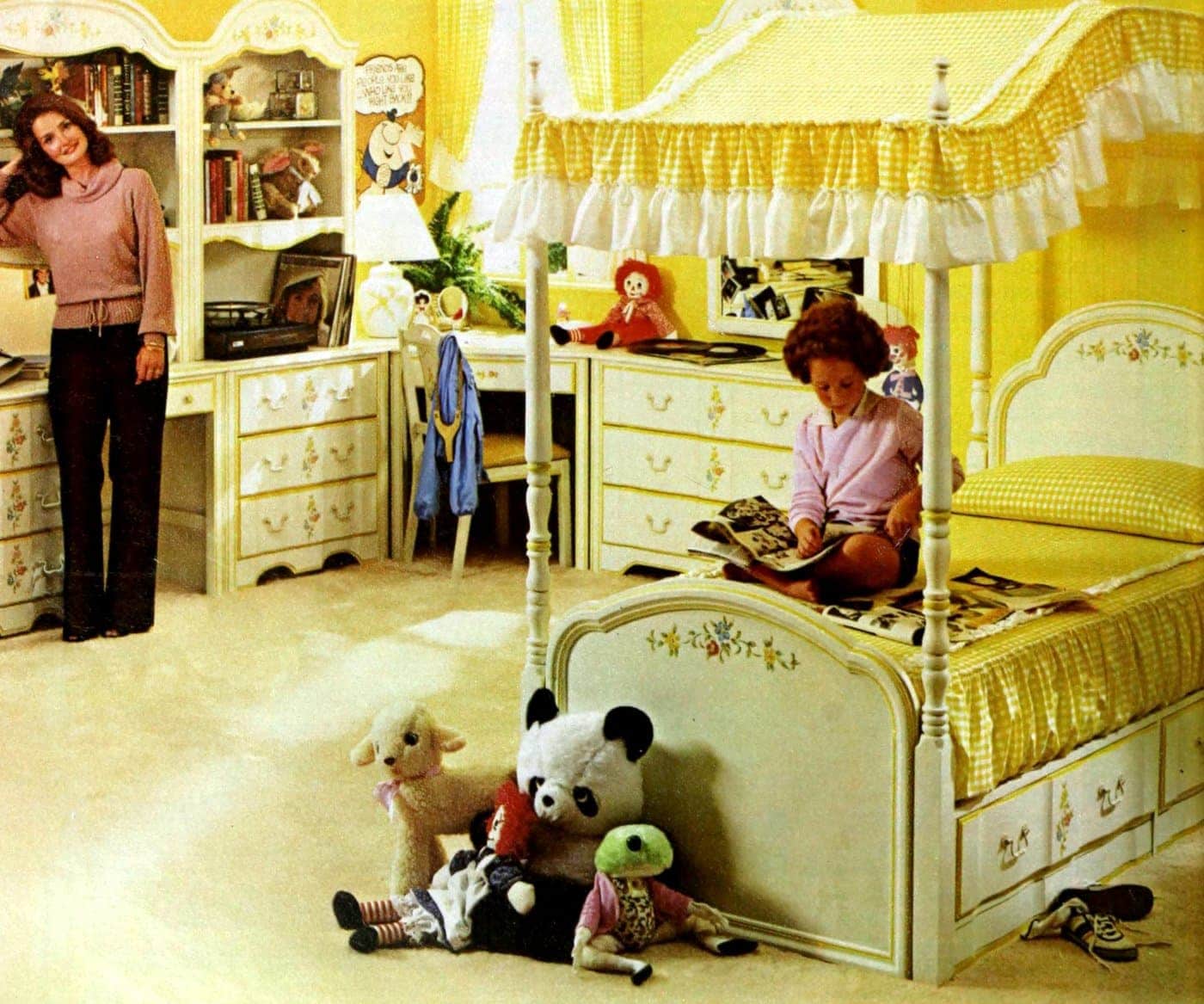
Floral polyester bedding sets in blue, pink and yellow

MORE: 33 fab vintage kids’ bedroom makeovers: Ideas & inspiration from the ’70s
Retro rainbow canopy bed decor was made easy with sheets (1973)
For years, regular bedsheets have been used to do much more than just serve as bedding! By using flat sheets, you could easily and affordably make all kinds of soft furnishings — like this rainbow canopy decor.
Especially in the 1960s and 1970s, companies happily promoted all the creative ways sheets could be used, running beautiful ads showing how even people who didn’t like to sew could decorate with them to create curtains and canopies, bedspreads and headboards, throw pillows and tablecloths, wallcoverings and ceiling shirring.
So, captivated by the decorative possibilities of using bright and vibrant retro 70s sheet sets, interior designer Angelo Donghia created this colorful, whimsical rainbow canopy bed decor.
Back in the early 1970s, he dramatized a tall tester bed in a child’s room by enclosing the bedposts in marvelous flounces of J P Stevens’ vintage “Rainbow” sheets (see if they’re available on eBay here). Then, using the same potent pattern, he reduced the tall ceiling’s height with a balanced canopy of shirring.
To cover the bedframe, the decorator arranged the flat sheets horizontally — making the very top a band of pink — but they could also be turned vertically, or used at a diagonal, for a different effect.
Inside the canopy, a pale sky blue fabric was used as a backing for the colorful striped material. Rainbows echoed in the padded, arched headboard against quiet, pewter walls, and the whole room was set upon a silvery gray carpet.
Next to the bed was a simple rectangular accent table, which was entirely colored in hot pink. A cloud white lamp and shade sat on the far side of the room. Also in the room were two pink and orange armless padded modern-style chairs that were upholstered in vinyl.

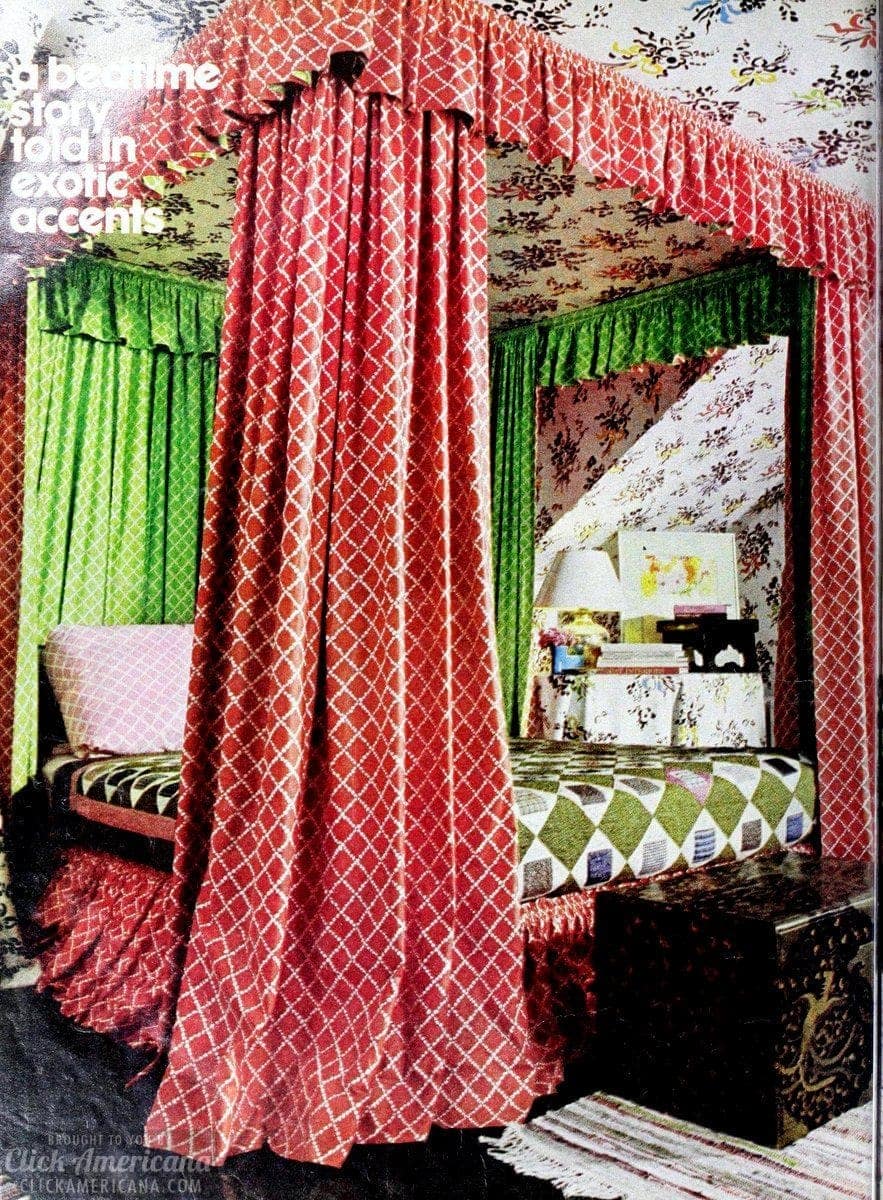
Canopy bed history: The romantic mystique of the 4-poster bed (1974)
Article by Marion Gough – House Beautiful, September 1974
Does anyone doubt that Sleeping Beauty slumbered the ages away in a four-poster bed canopied in gossamer gauze as ephemeral as the dreams she dreamt?
Whatever else would a princess sleep in — or a king or a queen or a courtesan or any heroine who ever lived happily ever after? You certainly don’t believe that the Prince took Cinderella home to a Murphy bed, do you?
No, no — it had to be a four-poster, massively columned and gilded, dazzling as her crystal slipper, and totally draped in cloth of gold.

THAT’S HOW IT IS WITH THE FOUR-POSTER BED. It invites flights of fancy. It’s a bed to be dreamed about as much as to dream in.
Else how to explain its persistent charm, the universal allure that has kept it right up there at the top of the if-I-had-my-druthers list of furniture for a full four centuries past its original reason for being?
And that, in the draughty Gothic days of yore, was to provide a framework for the heavy curtains that protected the occupants from nightly chills, meantime giving mamma and papa some measure of privacy within the family’s common bedroom.

IT SHOULD NOT DESTROY THE ILLUSION TO LEARN, if you don’t already know, that the farther-back genesis of the four-poster was a ticking stuffed with straw or leaves or feathers, laid on a chest against the wall, which later became a cupboard for sleeping.
The wall eventually became a headboard, the bed facing into the room with posts added to its foot, with a roof or tester overhead to support the draft-breaking curtains.
ALSO SEE: 12 examples of classic bedroom decor from the early 1900s
In the days of medieval princes — for the four-poster was not the prerogative of the hot polloi — this idea evolved into four demountable posts with side and end rails that the potentates could carry with them in their interminable journeys.
Hence the French word for furniture is meubles, the Italian one is mobili and the German is Mobel, each reflecting the mobility of noble household goods.
The posted bed was indeed the bed of kings. Egyptian pharaohs held court while reclining, the Indian Moguls dispensed law and order lounging on their divans, the “Bed of Justice,” and always under a sheltering canopy that signified that the sheltered one was a nabob.

THEREBY HANGS THE TALE OF THE TESTER, the equivalent of a roof over the bed, which was first the ceiling of a room itself, then became a separate frame, expanding with the grandiloquence of its owners until by the Renaissance, it was tantamount to a cornice in a building.
Bedposts exploded in avoirdupois concurrently, draperies became as rich as the silks of the Orient, and the not-inconsiderable skills of European weavers could produce. The bed was virtually a great room within a great room.
In 1580, the Great Bed of Ware was capable of accommodating six couples simultaneously — but let us not dwell upon the sensational.

Time marched on, and we find Louis XIV, who was not only the Sun King, but the acknowledged headman of the Boudoir Period in world history, conducting affairs of the realm at morning levees, enthroned in his bed of state, surrounded by his ebullient gold posts and armorial weavings as well as by his ministers and favorites. One assumes his nightshirts were up to these occasions.
CHARLES II, THAT MOST BED-MINDED ENGLISH MONARCH, was doing the same thing, and it is recorded that his mistress, Louise de Keroualle, received her morning visitors from a bed hung with the most wondrous French “tapissry,” a little gift from Charles. As for Nell Gwynn, she took her ease in a bed that was entirely sheathed in embossed and engraved silver.

RESEARCH UNCOVERS NO EVIDENCE OF BONA FIDE SOLID SILVER OR SOLID GOLD FOUR-POSTERS. But, conspicuous consumers being what they are in all ages, they surely must have existed outside of fairy tales. And metal beds there certainly have been.
In the late 18th century and in Napoleonic times, when officers went off to war with all the comforts of home, the iron “tent” bed went with them, and Hepplewhite’s “tent” or arc-shape tester may have stemmed from that.
As late as 1851, a knock-down officer’s bed of iron came in a neat, fold-up package, saving of space — if not sparing the brawn of the poor orderly who was delegated to carry it.

MORE: Hide-a-Bed sofas from the ’50s, ’60s & ’70s
IN THE 1830S, THOSE WITH A LOVE OF THE AUREATE and its luxurious connotation could sleep in beds that looked like gold, thanks to a patent that permitted the coating of cast iron with brass.
There were wondrously ponderous four-posters of brassed-over cast iron in florid Renaissance moldings ready to be dressed in princely damasks or velvets. And by the turn of the past century, many a “best bed” was spindled in glittering brass.

Charles Eastlake, the stern mid-Victorian advocate of Gothic simplicity, hailed the iron bed as an aesthetically sound and sanitary piece of “farm” furniture, designed one with a tester and pointed out that it was quite suitable, too, for well-placed families in the big cities.
Over the centuries, the four posts have taken many forms, fattening up, slimming down and fattening up again, much as a woman perennially on a diet. Posts ranged from the bulbous “cup and cover” melon shapes of Elizabethan oak to the “barley sugar,” Flemish-inspired twistings of William and Mary, to the Solomonic columns and polychrome of Saracenic Spain, to the squared-off pilasters of Chippendale’s Chinese pagoda beds to the pencil-slender and reeded delicacies of Sheraton and Hepplewhite, to the ponderous cluster-columns Victorians loved and had space for in their 14-foot-high rooms.

The weighty four-posters were much favored in the antebellum American South, and recollections of that romantic era surely must play a part in our present-day delight in the tester bed.
Do you not remember Scarlett clinging to a bedpost while her stays were being pulled around her waist?
Earlier in the history of the four-poster, beds were evaluated more for the grandeur of their curtainings — be they damask or tapestry, crewelwork or homely wool — than for the wood frames themselves.

So when Will Shakespeare bequeathed his second-best bed to his wife — which would seem ungallant of the Bard — it probably didn’t mean that he was relegating her to an uncomfortable mattress, but that the hangings were not as voguish as the ones on Bed Number One. They may well have been warmer.
And speaking of mattresses, whether you were prince or proletarian in a four-poster bed, whether your curtains were velvet embroidered in pearls or common linsey-woolsey, you slept on a stuffed ticking suspended from a criss-cross of ropes strung between the bed rails.
Mattresses on springs didn’t make the scene until the early 19th century. There wasn’t much bounce to the ounce in the good old days.
ALSO SEE: Did married couples really sleep in separate beds back in the ’50s?
Chippendale is credited for having revived the four-poster at a time when it was losing its prevalence. But the fact is that it has never gone “out of style.”

If its practical raison d’etre has long since disappeared with the coming of central heating and individual bedrooms, its appealing aura of the cherishable definitely lingers on.
Clearly, it must touch some real human needs, like the need to dream, to indulge our private hallucinations of grandeur, to feel embraced, protected, sheltered from the impingements of the outside world.
When Jan de Hartog made the four-poster the symbol of a marriage’s history, he may have come close to cracking the secret of its perennial come-on. Do we love it because it harks back to the past, gives us a sense of roots and continuity? We’ll leave that to the philosophers.
One thing we do know — if any one piece of furniture could be considered the family heirloom of the whole human race, it’s the dreamy four-poster.

More vintage canopy beds from the 1970s


Ruffly pink canopy coordinates: Bedding for girls


Bed with retro mod red and white patterned fabric

MORE TO SEE: Vintage beanbags & bean bag chairs: The retro ’70s casual seating fad
Patterned floral sheets were turned into canopies & drapes

Cherry wood armoires added traditional ambience to this 1970s yellow & green bedroom
This manorial bedroom — mellow, comforting, reviving a look of 18th-century French country house dignity — is a reminder that even a large room may need no more than a few pieces of furniture, if those pieces are important in scale and design quality.
The high, solid headboard of the canopy bed and the two armoires placed side by side seemed to panel the room, to “furnish” it with the patina of cherry wood and the pattern of their scroll carving. When decorating this 1970s yellow & green bedroom, interior designer June A Tedder used two fabrics almost architecturally.
First, she used a textured lemon cotton for the fitted coverlet, bed valance, and the formal lambrequin that framed the window. The color matched the room’s yellow shag carpeting perfectly.
Second, green-ground French floral print was employed to cover the outsize Bergere, to skirt the bed and underskirt the valance, and, as an effective surprise, to glass-curtain the window. (Fabric workmanship in a sparsely-furnished room must be impeccable.)

Cute retro canopy beds from the 1970s
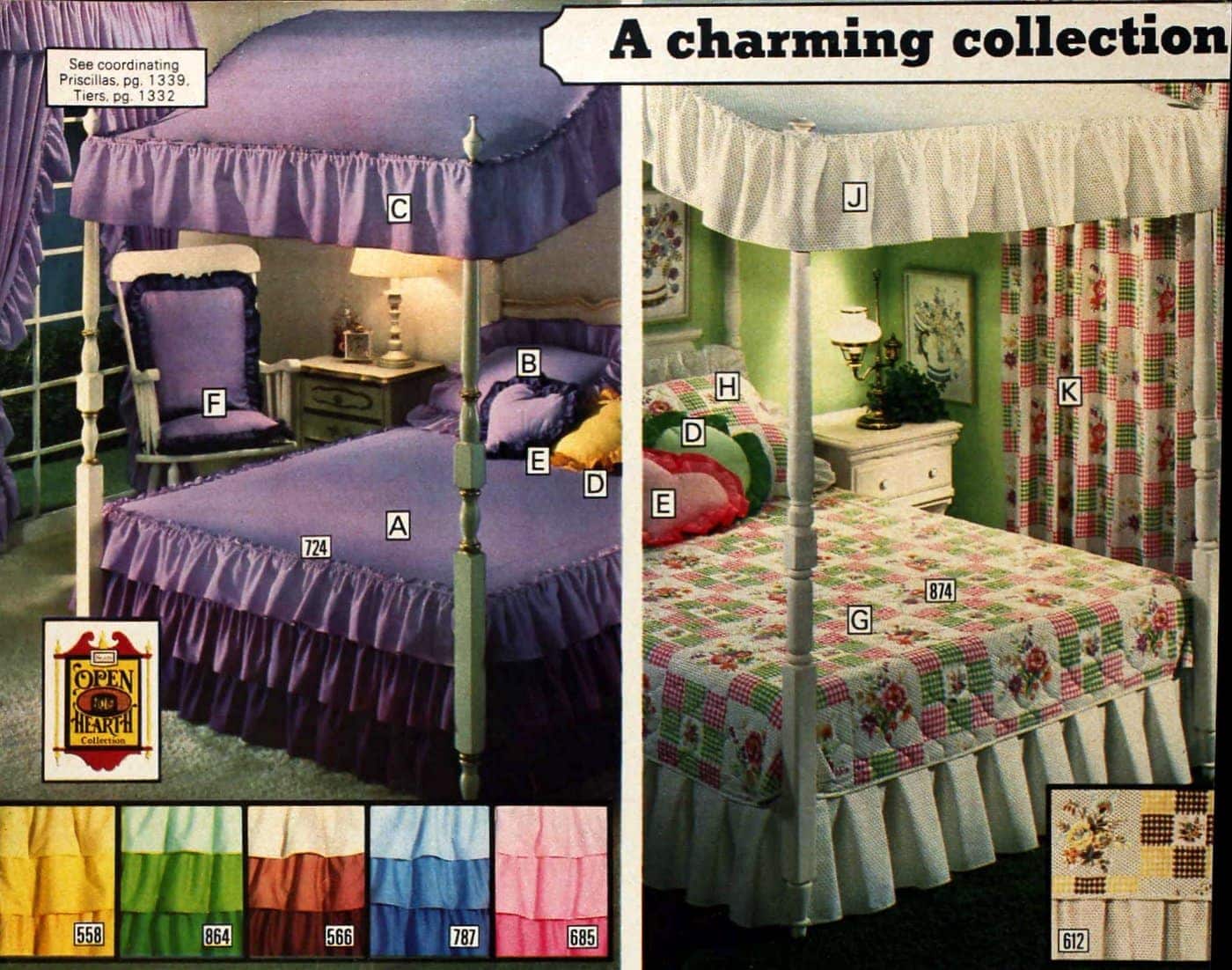
A fresh aqua look made with fabric for this caniopied bed

Old-fashioned green painted four-poster bed with green and white fabric canopy

MORE: Retro-style Granny squares are easy to crochet & can be used in so many ways
Vintage ’70s frilly white canopy bed
Remember these kind of old gold-edged bedroom sets? See more of them here!

Old-fashioned wood canopy bed with frilly floral fabric pattern

MORE: Vintage shag carpets: The super-popular deep & plush carpeting from the ’70s
Retro canopy bed: Fern pattern bedding
Retro pink canopy bed with matching loveseats
Frilly light blue and white checkerboard canopy and matching bedding

Matching twin canopy beds set at an angle in the corner

NOW SEE THIS: Vintage 1970s bedspreads: Soft retro home decor you may remember snuggling under
Two fresh & romantic canopy beds cozied up in a 1960s room of coral & white
Pink coral — heady and exhilarating — can turn any room into a perpetual valentine.
In this home from the 1960s, camelia pink and white butterfly & flower-patterned fabrics — on the romantic canopy beds, the chairs, the daybed and the drapes — made for a bedroom that was fresh and sweet. An elegant twist was the revival of old-fashioned spiral wood carving for the tall canopy bedposts on both beds.

Fall in love with a romantically serene old-fashioned bedroom with a vintage canopy bed
Here, in a 1960s room of romantic serenity, where the vintage canopy bed (or tester bed) rose almost architecturally from floor to ceiling.
Plain linen bed curtains were lined with the same print that covered the wall — a red and white luxury fabric from Spanish fashion designer Mariano Fortuny.
When this room’s look and feel was created back in 1965, interior designer Tony Duquette said he believed a decorator’s privilege was to help clients realize their own individuality, in surroundings that delight and sometimes surprise the eye.
Full-height wall fabric at each side of the bed was actually applied to floor-length roller shades that covered long windows, creating restful duskiness.
The bed throw was luxurious alpaca, while the floor was covered in a thick pale grey carpet. In the corners, mirrored panels, taken from a screen, gave the space glitter and depth. An antique upholstered bench at at the end of the bed, covered in the same fabric, to complete the look.

Peach decor warmed up this room around a vintage wrought iron canopy bed
In this 1970s bedroom’s sleeping area, a black vintage wrought iron canopy bed was piled high piled with pillows and luxurious fabrics.
With the bed then flanked with twin night tables, the combined effect was to form a little island of comfort. The comforter and bed skirt were peach-colored, while the chaise lounge at the end of the bed contrasted a peach background against black stripes.
On the bed itself, floral trim was added to Springmaid sheets and pillowcases. The floor was paved with neutral gray square ceramic tiles by American Olean. The room glittered with mirrors that created endless “horizons” and reflect over and over again the wallpaper’s geometric motifs. The paper pattern was very contemporary, but it was printed, romantically, in subtle shades of apricot and lavender on a shiny white background.



















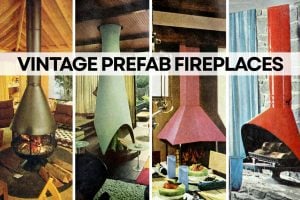




One Response
Thank you SO much for this compilation. I remember looking at that Sears catalog and wanting one of these so badly. I still do!